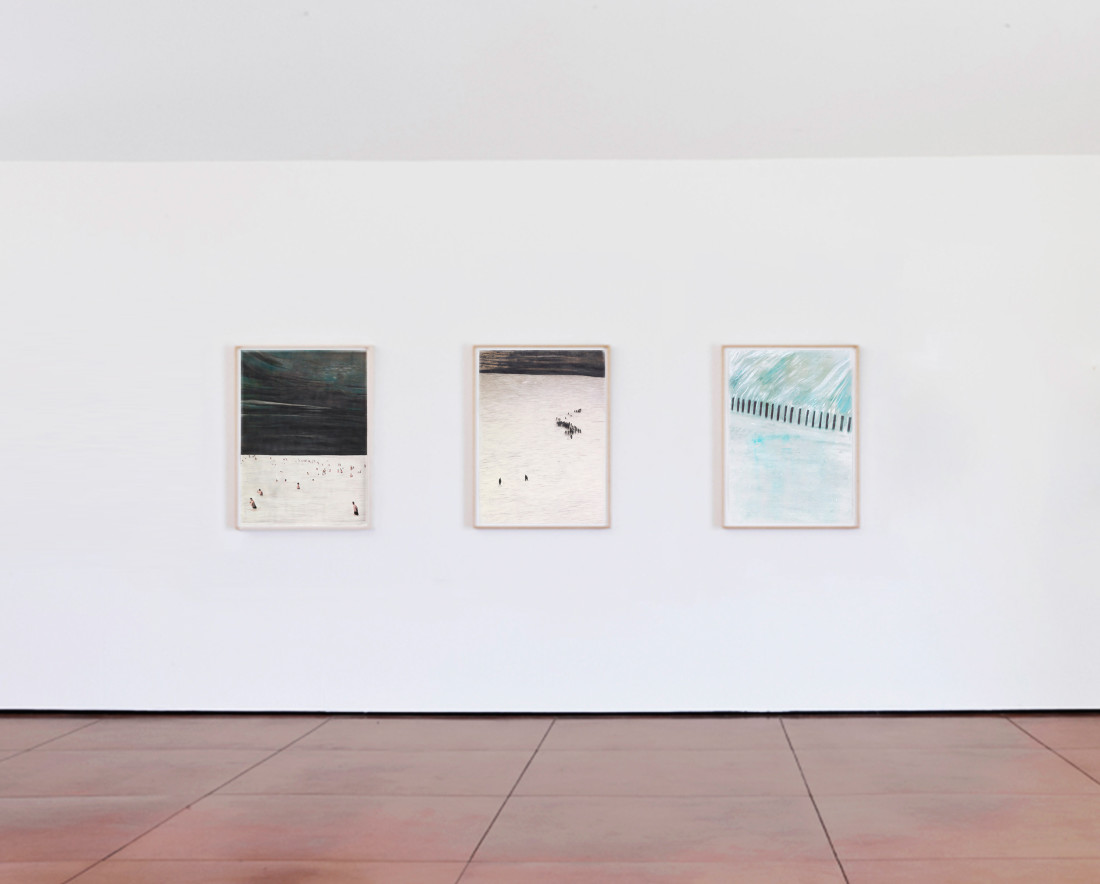




THE NORTHERN LIGHT SERIES
FROM THE NORTHERN LIGHT SERIES
The Pilgrimage of Humanity I, II, III, IV.
- Mixed media on cotton paper 300gr
- (02, 03, 04) 107 x 78 cm
- (01) 101 x 71 cm
- (2018)
Bedouin proverb: “You will live in tents every day, so that you may live long on earth, where you will live as strangers. “
It was not too long ago that we used to guide our paths with the stars. Nowadays, we live in an extremely complex geographical insubordination, even leading to the concept of « belonging » being questioned almost everywhere. In this sense, water has always been a driver of shaping identities and living environments – towns and, more widely, civilization has been built along and in strong connection with water bodies. More recently, this relationship, and consequently the physical space of water, is often neglected or perceived as an invisible/intangible element. Living with water also means to protect from extreme events. The process of civilization has been classified as a natural result, a condition which has been unequivocally forged through the making of many different cultures. But are cultures that have resulted in something else « failed cultures,» or are they alternatives to civilization? Or is civilization an accident against nature? Within a dystopian representation of collective memory through time, how can we identify and define ourselves while facing the challenge of a displaced evolutive process?
Water, that should be perceived as a resource, should also be read as a mean of negotiation between subjectivities/identities. The water resource is a breaking element in the condition of living. It is representational of a necessity to find ways to live together with the element and its forceless power and mutability. In Human behavior, indecision is a characteristic symptom of a crisis, a phenomenon applied to a personal or collective moment, which requires a decision, a feeling capable of preventing the crisis from escalating on a broader scale. “Geographical uncertainties are characterized by that passing state of doubt about the truth of something or the unknown development of a certain situation” (Alessandro Ricci, Geografia dell’incertezza, 2017): a condition where past, present or possible future scenarios are contemplated. As a status, uncertainty represents mankind’s history in an undefined time, due to the loss of the sense of truth and universality. The space of water has become often invisible and neglected, but the water itself does not disappear: water always finds its way in and out. Climate changes have forced us to live more often with extreme events ( e.g. droughts and floods). Therefore, populations have to constantly adapt to certain conditions and reframe their habits, their relationships with water resources, and the meaning given to them.
Ethnology of individualism, a subjectivity of solitudes: a dimension outside of physical time, a metaphor for a temporary, superficial passage. A liquid spatial dimension, in which to be together, but alone. The sets of a lack of terrestrial space will, in turn, become a place. The anonymity of the “non-places” traced is found in solitude, the commonality of human destinies. The proposed portion of (water) space is characterized by the omission of a shared territory, a set of time intervals representing the voids but containing the whole. The neglected space of water is proposed through a series of visual poems, embodying a sense of emptiness that becomes the face and voice of solitude that evokes millions of others. Such Foaucultian spaces of “otherness” embody an absence of the awareness of living spaces and shared environments/territories. Those spaces of subjectivation drastically removed the awareness and possible interaction of bodies and their possible immediate surroundings. Water bodies possess their own borders. Historically water bodies (rivers/lakes/creeks) marked the differences between them and us, between different nations. Such subjective acts of delimitation have often been objectifying to overcome and to conquer because of its importance as a primary resource for livelihood. The analogy of water and the state of “uprooted” also concerns the psychological sphere, but, precisely for these reasons, it also deals with relations between nations and the international geopolitical areas. Such as culture and identities, water does not have fixed delimitations; it morphs constantly following diversified motions in relation to its own terms and geo-climatic conditions.
THE NORTHERN LIGHT SERIES explores the relationships between the intangible feel of belonging and water(s) geographical identity morphosis. Alike a liquid in constant motion, the definition of “humanity” finds its real essence within the multitudes of human agglomerations that it is in itself able to include. This series of works represents a venture to re-define an unknown spatial location, in an attempt to build up an imaginary that evidences a specific human condition, which means the purest expression of our nature as human beings, with all the consequences that this entails.


